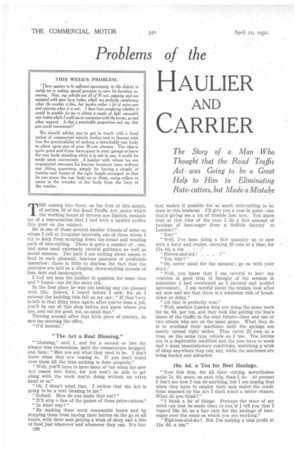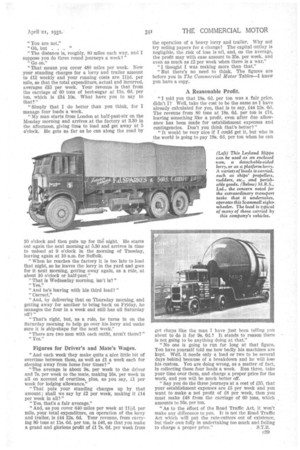Problems of the
Page 60

Page 61

If you've noticed an error in this article please click here to report it so we can fix it.
HAULIER
AND
CARRIER
The Story of a Man Who Thought that the Road Traffic Act. was Going to be a Great Help to Him in Eliminating Rate-cutters, but Made a Mistake
THE coming into force, on the first of this month, of section 19 of the Road Traffic Act, under which the working hours of drivers are limited, reminds me of a conversation that I had with a haulier earlier this year on the subject.
He is one of those several haulier friends of mine on whom I call at irregular intervals, one of those whom I try to keep from straying down the broad and winding path of rate-cutting. There is quite a number of iem, and some need extremely careful guidance as well as moral suasion. The path I am writing about seems to lead to such pleasant, luscious pastures of profitable operation: there is little to disclose the fact that the pastures are laid on a clinging, down-sucking morass of. loss, debt and bankruptcy.
I had not seen the haulier in question for some time and T found—but let the story tell.
In the first place he was not looking any .too pleased with life., Indeed, I heard before I saw, for as I entered the 'building this fell on my ear : "If that brry is left in that filthy state again, after you've done a job, you'll be out of this shop before you know where you are, and out for good, too, so mind that."
Turning around after that little piece of oratory, he saw me entering the office.
" G'd mornin'."
"The Act a Real Blessing."
"'Morning," said I, and for a second or two the silence was tremendous, until the temperature dropped, and then: "Men are not what they used to he. I don't know what they are coming to. If you don't stand over them all the time nothing is done properly."
"Well, you'll have to have more of 'ern when the new Act comes into force, for you won't be able to get along with the work you're doing without an extra hand or so."
"Oh, I shan't mind that. I reckon that the Act is going to be a real blessing to me."
"Indeed. How do you make that out?"
"It'll stop a few of the games of these price-cutters." "In what way?"
"By making them work reasonable hours and by stopping them from having their lorries on the go at all hours, with their men getting a wink of sleep and a bite of food just wherever and whenever they can. It's that
c38
that makes it possible for so much rate-cutting to be done in this business. I'll give you a case in point—one that's giving me a lot of trouble just now. • You know that at this time of the year I do a fair amount of haulage of beet-sugar from a Suffolk factory to London?"
" Yes? "
"Well, I've been doing a fair quantity up to now with a lorry and trailer, carrying 20 tons at a time, for us. (id. a ton .
"Eleven-and-six "Yes, why?"
Oh, never mind for the moment ; go on with your stoxy."
"Well, you know that I am careful to keel' my vehicles in good trim (I thought of the sermon in miniature I had overheard as I entered and nodded agreement). I am careful about the brakes, look after my men and see that there is a minimum risk of breakdown or delay."
"All that is perfectly true."
"Well, another London firm are doing the same work for 9s. 6d. per ton, and they look like getting the lion's share of the traffic in the near future—they and one or two others who are on the same game. What they do is to overload their machines until the springs are nearly turned right under. They carry 25 tons at a time, on the same type vehicle as I use. The lorries are in a deplorable condition and the men have to work und:r most unsatisfactory conditions, snatching a wink of sleep anywhere they can, say, while the machines are being loaded and unloaded.
18s. 6d. a Ton for Beet Haulage.
"Now this firm, for all their cutting, nevertheless make 7s. 6d. more, on each trip, than I do. At present I don't see how I can do anything, but I am hoping that when they have to employ their men under the conditions imposed by the Act I shall stand a better chance. What do you think?"
"I think a lot of things. Perhaps the state of my mind can best be made clear to you if I tell you that I regard 18s. 6d. as a fair rate for the haulage of beetsugar over the route on which you are working."
"Eighteen-and-six? But I'm making a nice profit at, 11s. fid. a ton." "You are not."
"Oh, but . .
"The distance is, roughly, 80 miles each way, and I suppose you do three round journeys a week?"
'Go on."
"That means you cover 480 miles per week. Now your standing charges for a lorry and trailer amount to £12 weekly and your running costs are hid. per mile, so that the total expenditure, actual and incurred, averages £35 per week. Your revenue is that from the carriage of 60 tons of beet-sugar at lie. 6d. per ton, which is £34 10s. What have you to say to that?"
"Simply that I do better than you think, for I manage four loads a week.
"My man starts from London at half-past-six on the Monday morning and arrives at the factory at 3.30 in the afternoon, giving time to load and get away at 5 o'clock. He gets as far as he can along the road by
10 o'clock and then puts up for the night. He starts out again the next morning at 5.30 and arrives in time to unload at 9 o'clock in the morning of Tuesday, leaving again at 10 a.m. for Suffolk.
" When he reaches the factory it is too late to load that night, so he leaves the lorry in the yard and goes for it next morning, getting away again, as a rule, at about 10 o'clock or half-past."
" That is Wednesday morning, isn't is?"
"Yes."
"And he's leaving with his third load?"
"Correct," "And, by delivering that on Thursday morning, and getting away for another to bring back on Friday, he manages the four in a week and still has all Saturday off?"
"That's right, but, as a rule, he turns in on the Saturday morning to help go over his lorry and make sure it is ship-shape for the next week."
"There are two men with each outfit, aren't there?" "Yes."
Figures for Driver's and Mate's Wages.
"And each week they make quite a nice little bit of overtime between them, as well as £1 a week each for sleeping away from home four times?"
"The average is about 9s. per week to the driver and 7s. per week to the mate, making 16s. per week in all on account of overtime, plus, as you say, £1 per week for lodging allowance."
"That puts your standing charges up by that amount; shall we say by £2 per week, making it £14 per week in all?"
"Yes, that's a fair average."
"Anil, as you cover 640 miles per week at 114.d. per mile, your total expenditure, an operation of the lorry and trailer, is 144 12s. 6d. Your revenue, from carrying 80 tons at 1.1.s. 6d. per ton, is £46, so that you make a grand and glorious profit of £1 7s. 6d. per week from
the operation of a heavy lorry and trailer. Why not try selling papers for a change? The capital outlay is negligible, the risk of loss is nil, and, on the average, the profit may with ease amount to 35s. per week, and even as much as 12 per week when there is a war."
"I thought I was making more than that."
"But there's no need to think. The figures are before you in The Commercial Motor Tables—I know you have a copy.
A Reasonable Profit.
"I told you that 18s. 6d. per ton was a fair price, didn't I? Well, take the cost to be the same as I have already calculated for you, that is to say, £44 12s. 64. The revenue from 80 tons at 18s. 6d. per ton is 174, leaving something like a profit, even after due allowance has been made for establishment expenses and contingencies. Don't you think that's better?"
"It would be very nice if I could get it, but who in the world is going to pay 18s. 6d. per ton when he can get chaps like the man I have just been telling you about to do it for 9s. 6d.? It stands to reason there is not going to be anything doing at that."
"No one is going to run for long at that figure. You have yourself told me how badly his machines are kept. Well, it needs only a load or two to be several days behind because of a breakdown and lie will lose his custom. You are doing wrong, as a matter of fact, in collecting these four loads a week. Run three, take your time over them, and charge a proper price for the work, and you will be much better off.
"Say you do the three journeys at a cost of £35, that your establishment expenses are £5 per week and you want to make a net profit of £8 per week, then you must make 148 from the carriage of 60 tons, which amounts to 16s. per ton.
"As to the effect of the Road Traffic Act, it won't make any difference to you. It is not the Road Traffic Act which will put the rate-cutters out of existence, but their own folly in undertaking too much and failing to charge a proper price." . S.T.R.












































































































